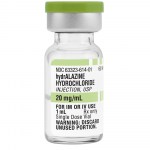- Type of Drug: Antihypertensive
- Prescribed for: Hypertension (high blood pressure), aortic insufficiency after heart valve replacement, and congestive heart failure
Hydralazine Hydrochloride General Information
Although its mechanism of action is not completely understood, Hydralazine Hydrochloride is believed to lower blood pressure by enlarging the blood vessels throughout the body. This also helps to improve heart functions and blood flow to the kidneys and brain.
Cautions and Warnings
Long-term administration of more than 200 mg per day of Hydralazine may produce lupus erythematosus, an arthritis-like syndrome (muscle and joint pains, skin reactions, fever, anemia), although symptoms of this problem usually disappear when the drug is discontinued. Fever, chest pain, feelings of ill health, or other unexplained symptoms should be reported to your doctor. The chances of this happening increase as your dose of Hydralazine increases; 10 to 20 percent of people taking 400 mg per day of Hydralazine will develop lupus.
Hydralazine may actually improve kidney blood flow and kidney function in people who have below-normal function. It should be used with caution in people with advanced kidney damage.
Hydralazine may worsen specific heart problems and should be used with care in people with a history of heart disease. It can cause angina pain and has been thought to cause heart attacks.
Tingling in the hands or feet caused by Hydralazine may be relieved by taking vitamin B6 (Pyridoxine).
People taking Hydralazine may develop reduced red-blood-cell counts and hemoglobin. Reduced white-blood-cell and platelet counts can also occur, Periodic blood counts are recommended while taking Hydralazine.
Hydralazine Hydrochloride Possible Side Effects
- Most common: headache, loss of appetite, nausea, vomiting, diarrhea, rapid heartbeat, and chest pain.
- Less common: stuffy nose, flushing, tearing in the eyes, itching or redness of the eyes, numbness or tingling in the hands or feet, dizziness, tremors, muscle cramps, depression, disorientation, anxiety, itching, rash, fever, chills, occasional hepatitis (yellowing of the skin or eyes), constipation, difficulty in urination, and adverse effects on the normal composition of the blood.
Drug Interactions
• Taking Hydralazine with Metoprolol or Propranolol (beta blockers) can result in raised blood levels of any of the drugs.
• Indomethacin can reduce the effects of Hydralazine.
• Do not self-medicate with over-the-counter cough, cold, or allergy remedies whose stimulant ingredients can increase blood pressure.
Food Interactions
Hydralazine Hydrochloride may antagonize vitamin B6 (pyridoxine), which can result in peripheral neuropathy (tremors or tingling and numbness of the fingers, toes, or other extremities). If these symptoms occur, your doctor may consider Pyridoxine supplementation.
Hydralazine Hydrochloride Usual Dose
As with other antihypertensive drugs, dosage is tailored to your specific needs.
Adult: 40 mg per day for the first few days; increase to 100 mg per day for the rest of the first week. Dose increases until the maximum effect is seen.
Child: 0.34 mg per pound of body weight per day; increase up to 200 mg per day.
Overdosage
If symptoms of extreme lowering of blood pressure, rapid heartbeat, headache, generalized skin flushing, chest pains, or poor heart rhythms appear, contact your doctor immediately. If you go to a hospital emergency room for treatment, ALWAYS bring the medicine bottle with you.
Hydralazine Hydrochloride Special Information
Take this medicine exactly as prescribed.
Call your doctor if you experience a prolonged period of unexplained tiredness, fever, muscle or joint aching, or chest pains while taking this drug.
If you forget to take a dose of Hydralazine Hydrochloride, take it as soon as you remember. If it is almost time for your next dose, skip the one you forgot and continue with your regular schedule. Do not take a double dose.
Special Populations
Pregnancy/Breast-feeding
Animal studies with high doses of Hydralazine have shown that it causes birth defects, although this has not been found in humans. Blood-related problems have been seen in newborns whose mothers took Hydralazine during pregnancy. These problems got better on their own in 1 to 3 weeks. Pregnant women and those who might become pregnant should not take this drug unless all the possible benefits and risks have been considered.
Hydralazine passes into breast milk but has caused no problems in breast-fed infants.
Seniors
Older adults are more sensitive to the side effects (especially low body temperature) and blood-pressure-lowering effects of this drug. Follow your doctor’s directions, and report any side effects at once.

